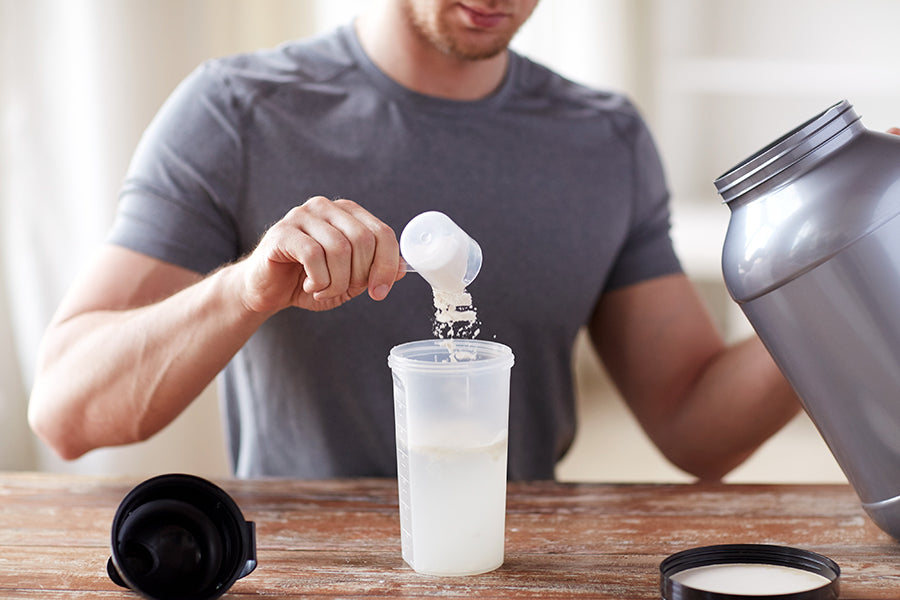Creatine is a compound naturally produced in the body, mostly in the liver. It's also found in small amounts in fish and meat. Some people take creatine as a dietary supplement, particularly athletes because it's thought to improve exercise performance.
Creatine works by providing energy for muscles to contract during exercise. The body stores creatine in the muscles. During exercise, phosphocreatine is broken down to release energy. This extra energy may help you exercise longer or increase your muscle mass.
Creatine is available as an over-the-counter (OTC) supplement. It's sold in powder, pill, and liquid forms. You can also find foods enriched with creatine, such as protein powders and pre-workout drinks.
This article will discuss everything you need to know about creatine, including its benefits, side effects, and how to take it.
Why Take Creatine?
People might take creatine for a few reasons, but the most common is to help increase muscle mass. Creatine helps supply the muscles with energy, which can help you lift heavier weights and build more muscle. Additionally, creatine can improve your recovery after exercise, so you can hit the gym more often without overtraining.
However, a few things to consider when taking creatine supplements include drinking plenty of water and avoiding taking too much at once. Overall, creatine is a helpful supplement that can offer a range of benefits.
Taking Creatine Before a Workout
Creatine is a compound that helps supply energy to cells. Taking creatine as a supplement helps increase the creatine levels in your muscles, which can lead to improved performance during exercise.
Several studies have shown that taking creatine before a workout can help you increase your strength and power. Creatine can also improve recovery after exercise so you can return to your normal routine more quickly. If you are looking for an edge during your workouts, taking creatine before you exercise may be what you need.
Related Article: What Everyone in the Fitness World Needs to Know About Pre-Workout Supplements
Taking Creatine After a Workout
Many people take creatine after a workout to help their muscles recover. Taking creatine after a workout can help replenish the body's stores of this substance, and it has been shown to improve muscle recovery after exercise.
Many products on the market contain creatine, which is also available in powder form. Taking creatine after a workout can be an effective way to improve muscle recovery and promote growth.
Benefits of Creatine
Creatine has been shown to provide various health benefits, making it an important supplement for many people. It is often used to improve performance, but there are also many other potential benefits of creatine.
Increases Muscle Mass
Creatine can help increase muscle. It provides additional energy to the muscles, allowing them to work harder and longer. This increased level of activity can lead to more muscle growth over time.
Creatine is an effective way to boost muscle growth. However, it's important to note that creatine should be used in conjunction with other activities, such as weightlifting and eating a healthy diet, or it will not have much of an impact if taken on its own.
Improves Athletic Performance
Creatine reduces the amount of lactic acid that builds up in the muscles during exercise, which can lead to improved performance. Creatine is most commonly used by athletes looking to improve their performance in short bursts of activity, such as sprinting or weightlifting.
Enhances Brain Health
Creatine helps increase the ATP levels in the brain, which is essential for cognitive function. It also helps improve blood flow to the brain, providing it with essential nutrients and oxygen.
In addition, creatine has been shown to reduce inflammation in the brain, which can damage brain cells. Therefore, creatine supplementation can be an effective way to improve brain health.
Improves Heart Health
There are different ways in which creatine improves heart health. First, creatine can help improve the function of the heart muscle itself. Second, creatine can help reduce inflammation and oxidative stress in the heart, which are major causes of heart disease.
And finally, creatine can help increase "good" HDL cholesterol levels and decrease "bad" LDL cholesterol levels.
Related Article: The Benefits of Multivitamins: 8 Surprising Reasons to Take Them
Side Effects of Creatine
Creatine is a safe and effective supplement, but there are a few potential side effects. One common side effect is water retention, which can cause the muscles to swell. Additionally, taking too much creatine at once can lead to stomach upset, diarrhea, and nausea. It's important to start with a low amount and gradually increase the intake to minimize these side effects.
Additionally, it's important to drink plenty of water when taking creatine supplements, as they can cause dehydration. Be sure to stay hydrated when taking creatine and avoid excessive caffeine and alcohol intake, as they can also lead to dehydration.
Overall, creatine is considered a safe and effective supplement that can offer a range of benefits. However, being aware of the potential side effects and taking precautions is important.
When to Take Creatine
There are different times when you might want to take creatine supplements, depending on your goals. If you want to increase muscle mass, taking creatine before and after your workouts is best. This will help you maximize the benefits of this supplement.
Additionally, if you want to improve recovery time after exercise, taking creatine after your workouts can be helpful. If you are not interested in increasing muscle mass, you can take creatine as a daily supplement. This can help improve overall health and may offer some benefits for athletes.
However, it's important to note that taking creatine normally may not provide the same performance benefits as taking it before and after workouts.
The Best Way to Take Creatine
There are many ways to take creatine, as everyone will have different needs and goals. However, a few general tips can be useful to get the most out of this supplement.
When taking creatine, it's important to drink plenty of water. Mix it with a liquid and drink it immediately. Drinking plenty of fluids when taking creatine is also important, as this will help prevent dehydration and allow the body to absorb the creatine more quickly and efficiently.
Taking too much creatine at once can cause stomach upset, diarrhea, and nausea. Start with a small dose and increase until you find what works best. When taken correctly, creatine is considered a safe and effective way to improve exercise performance.
FAQs
1. What does creatine do for your body?
Creatine is a nitrogenous organic acid that occurs naturally in the body and helps supply energy to cells throughout the body, primarily muscle cells.
Creatine supplements are popular among athletes and weightlifters because they help improve performance and muscle growth. While research on creatine is ongoing, early studies suggest that it may be effective in increasing muscle mass, strength, and power. However, more research is needed to determine creatine supplements' long-term safety and efficacy.
2. Is it healthy to take creatine?
Yes. Creatine is a natural substance found in the body and foods like red meat. It helps the body create energy. Creatine is safe for most people, but it's not recommended for pregnant women or people with kidney problems. Talk to your doctor before taking creatine if you have any health concerns.
3. What are the side effects of creatine?
Some potential side effects of creatine include weight gain, water retention, nausea, cramps, diarrhea, and dizziness. However, most people do not experience these side effects when taking creatine. The side effects of creatine are mostly minor, and they can be reduced by taking breaks from using the supplement, drinking plenty of fluids, and monitoring intake.
4. Does creatine help gain muscle?
Yes, creatine helps gain muscles. It is said to improve strength and lean muscle mass.
The Bottom Line
Supplementing with creatine has many benefits that can help you reach your fitness goals. It is important to remember that taking creatine is most effective when it is part of a healthy diet and workout routine. Creatine should be taken before or after workouts, and there are different ways to take it, depending on your preference. There are also some side effects to be aware of, but overall supplementing with creatine is safe for most people. When used correctly, creatine can help you see results quickly and effectively.
Reading List
Article Sources
- Cooper, Robert, et al. “Creatine Supplementation with Specific View to Exercise/Sports Performance: An Update.” Journal of the International Society of Sports Nutrition, vol. 9, July 2012, p. 33. PubMed Central, https://doi.org/10.1186/1550-2783-9-33.
- Hoffman, Jay, et al. “Effect of Creatine and SS-Alanine Supplementation on Performance and Endocrine Responses in Strength/Power Athletes.” International Journal of Sport Nutrition and Exercise Metabolism, vol. 16, no. 4, Aug. 2006, pp. 430–46. journals.humankinetics.com, https://doi.org/10.1123/ijsnem.16.4.430.
- Kreider, Richard B. “Effects of Creatine Supplementation on Performance and Training Adaptations.” Molecular and Cellular Biochemistry, vol. 244, no. 1, Feb. 2003, pp. 89–94. Springer Link, https://doi.org/10.1023/A:1022465203458.
- Ostojic, Sergej M., and Zlatko Ahmetovic. “Gastrointestinal Distress after Creatine Supplementation in Athletes: Are Side Effects Dose Dependent?” Research in Sports Medicine (Print), vol. 16, no. 1, 2008, pp. 15–22. PubMed, https://doi.org/10.1080/15438620701693280.
- Riesberg, Lisa A., et al. “Beyond Muscles: The Untapped Potential of Creatine.” International Immunopharmacology, vol. 37, Aug. 2016, pp. 31–42. PubMed Central, https://doi.org/10.1016/j.intimp.2015.12.034.
- Roschel, Hamilton, et al. “Creatine Supplementation and Brain Health.” Nutrients, vol. 13, no. 2, Feb. 2021, p. 586. PubMed Central, https://doi.org/10.3390/nu13020586.
- Valaei, Kosar, et al. “Cardiac Oxidative Stress and the Therapeutic Approaches to the Intake of Antioxidant Supplements and Physical Activity.” Nutrients, vol. 13, no. 10, Sept. 2021, p. 3483. PubMed Central, https://doi.org/10.3390/nu13103483.
- Wiklund, Olov, et al. “Monitoring of Lipids, Enzymes, and Creatine Kinase in Patients on Lipid-Lowering Drug Therapy.” Current Cardiology Reports, vol. 15, no. 9, July 2013, p. 397. Springer Link, https://doi.org/10.1007/s11886-013-0397-8.
- Wu, Shih-Hao, et al. “Creatine Supplementation for Muscle Growth: A Scoping Review of Randomized Clinical Trials from 2012 to 2021.” Nutrients, vol. 14, no. 6, Mar. 2022, p. 1255. PubMed Central, https://doi.org/10.3390/nu14061255.











